Increasing awareness of acquired brain injury in Scotland
In this blog, we share our experiences leading two events to disseminate the YARNS Transitions project and increase awareness of acquired brain injury (ABI). The events were part of our participation in the 2023 Festival of Festival of Social Science organised and funded by the Economic and Social Research Council.
Festival of Social Science
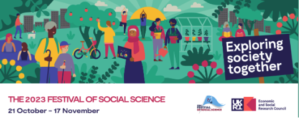
In October 2023, the YARNS Transitions project team led two initiatives as a part of the 2023 Festival of Festival of Social Science, disseminating the project and increasing awareness of acquired brain injury (ABI). The festival explores the world of social science, from how society has shaped local areas to behaviours that help fight climate change. Thisyear’s events were focused on lifelong wellbeing, exploring mental and physical health at all ages and celebrating the 75th anniversary of the NHS. The initiative was funded by the Economic and Social Research Council. If you want to know about our event at Waverly Station, please follow the link.
Recovering life after Acquired Brain Injury
The first event was on 21st October at Waverly Station in Edinburgh. The event engaged the public in into the fascinating world of the human brain as well as invited travellers to participate in a series of interactive activities suitable for both children and adults to engage and learn about brain health and ABI rehabilitation for young adults.
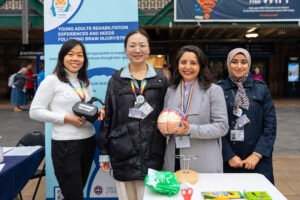
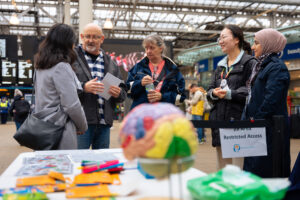
We offered four activities:
Maze and Puzzle Challenges. The public tested their skills with maze and puzzle challenges using a mirror and using their non-dominant hands to discover the challenges that stroke survivors might face in their daily lives.
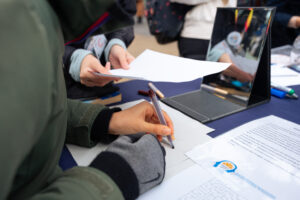
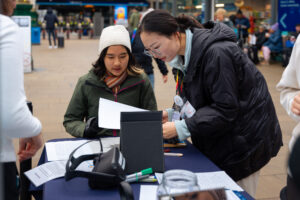
Brain Health Education Activity. Participants developed their creativity while colouring and learning about different brain regions and their functions. The activity was suitable for all ages, which proved to be very popular amongst the youngest travellers! Parents often asked to take the colouring sheets away, so they could coloured on journey.


Get hands-on with a brain model: The activity, which was also very popular, invited the public to explore the wonders of the human brain. Participants had the opportunity to hold the brain in their hands, exploring its anatomy, functions, while asking questions.

360 Video Experience: The public was invited to dive into an immersive 360 degree video experience, using a virtual reality headset to see the world from the perspective of young adults with aphasia after stroke.
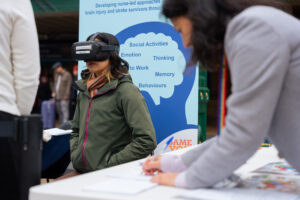
World Stroke Day event in Edinburgh.
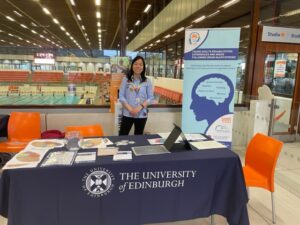
We offered the same four activities:
Maze and Puzzle Challenges. Swimming pool members and staff tested their skills with maze and puzzle challenges using a mirror and using their non-dominant hands to discover the challenges that stroke survivors might face in their daily lives.

Get hands-on with a brain model: The activity, which was also very popular, invited the public to explore the wonders of the human brain. Participants had the opportunity to hold the brain in their hands, exploring its anatomy, functions, while asking questions. It’s also great fun!
360 Video Experience: The public was invited to dive into an immersive 360 degree video experience, using a virtual reality headset to see the world from the perspective of young adults with aphasia after stroke.

During the events, we were able to engage with more than 76 adults and a number of children who participated in our activities. The participants found the activities valuable and informative. We collected feedback from attendees, who kindly provided rewarding comments about our event.
‘’This is fun and helpful for people who don’t have knowledge of brain damage and structures of brains’’
‘’Was very helpful and useful’’
‘’The exercises were really fun. Love the brains!’’
‘’The exercises were very insightful and the knowledge gained can literally save a life, very informative & friendly!’’
‘’Excellently conducted! Especially good to kill time and realise that I need to improve my skills. It created more empathy’’
Thank you to all participants, the YARNS Transition team, the 2023 Festival of Festival of Social Science for organising the series of events, the Economic and Social Research Council for funding it. Also big thanks to the World Stroke Organization for helping us to promote the event.
Calling for young adult ABI survivors!
If you live in the UK and would like to help guide our research project, please contact us at our email address, yarnspro@ed.ac.uk or social media, X @YANRSproject . We would love to know any insights you may have to improve our work.
We are looking forward to hearing from you!
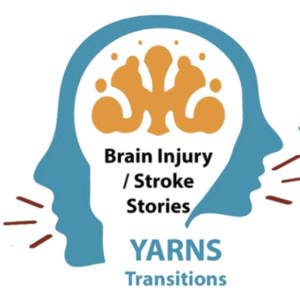




Recent comments